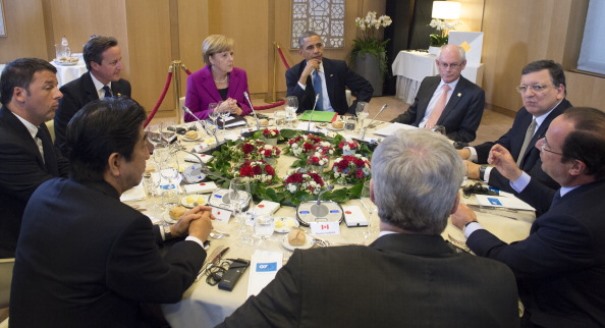If ever there was an opportunity for the West to pull together, it was on June 4, when leaders of the G7 major industrialized nations met in Brussels.
U.S. President Barack Obama had just flown in from Warsaw. There, he had spent many hours reassuring Poland and other countries in the region that the United States would boost their defenses.
In concrete terms, he proposed a $1 billion fund to train Eastern European countries’ armed forces and improve their military capabilities. That was well short of what Poland wanted, which was a commitment for NATO to set up permanent bases in that part of Europe.
In fact, those bonds have rarely been so weak. Europe, for the most part, is rudderless, while the Obama administration is hobbled by a public tired of war and sees no reason why it should become embroiled in Ukraine’s crisis.
In Europe, Britain’s influence is rapidly waning. UK Prime Minister David Cameron has been huffing and puffing and threatening to leave the EU if Jean-Claude Juncker, a committed federalist, is chosen as the next European Commission president. Cameron knows that Angela Merkel, the German chancellor, holds most of the cards over who gets that top post. Even though Merkel (and the United States) wants Britain to remain in the EU, she is no mood to cede to Cameron’s threats.
When it comes to bolstering the transatlantic relationship, the German chancellor is in a very weak position to make a difference. That is because the U.S. National Security Agency (NSA) spying scandal will not go away. On June 4, Harald Range, Germany’s federal prosecutor, announced he was going to launch formal proceedings into allegations that the NSA had monitored Merkel’s cell phone.
The NSA scandal has already fed a growing anti-Americanism in Germany in a way that affects foreign policy decisions. For example, Germany has opposed any attempt by NATO to deploy troops on a permanent basis in the alliance’s Eastern members. The German public, which is growing increasingly skeptical of NATO and, by extension, of the United States, sees such a move as a militaristic and provocative step on the part of Washington. And even though Obama and Merkel have established a much closer bilateral relationship, especially during the Ukraine crisis, the fallout from the NSA scandal constrains Merkel’s ability to strengthen broader transatlantic ties.
Obama cannot rely much on France either. Washington has considerable respect for French President François Hollande’s decision to send troops to Mali and the Central African Republic. But Obama cannot push Hollande into taking a tougher stance against Russia. Despite U.S. pressure, Hollande has made it clear that he will not abandon the sale of Mistral-class warships to Russia. There are too many jobs at stake.
Yet European leaders can ill afford to allow the transatlantic relationship to weaken even further. Because of their unwillingness to take defense and security seriously, Europeans remain almost completely dependent on the United States to provide them with its security umbrella.
And despite the Ukraine crisis and the modernization of Russia’s armed forces, most Western European governments will not increase their defense spending. Somehow, they assume that Washington will always provide the cover. Perhaps it was Obama’s mistake to offer $1 billion to Poland and other countries in the region without insisting that America’s European allies match that sum or at least contribute to it.
During his speech in Warsaw on June 3, Obama did ask the Europeans to carry some of the burden. But his appeal was halfhearted in tone. The United States knows that in the past, such pleas have fallen on deaf ears in most Western European capitals—as if the Ukraine crisis wasn’t enough reason to boost transatlantic bonds.






.jpg)